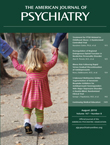Analysis of Antipsychotic Dose Reduction
To the Editor: In the June 2010 issue of the Journal, Chuan-Yue Wang, M.D., Ph.D., et al. (1) conducted an open-label randomized controlled trial to examine the effects of reducing the risperidone dose in schizophrenia patients who had completed an acute phase treatment. The authors concluded that maintenance treatment at the initial dose for at least 1 year was safer and more effective in relapse prevention than the reduced dose strategy.
First, Drs. Wang et al. separately examined dropout rates as a result of "relapse" or "any reason other than relapse." However, overall treatment failure as a result of any reason is a more clinically pragmatic outcome. Had this outcome measure been adopted, the significant superiority in the no dose reduction group would have disappeared (χ2=1.57, df=2, p=0.455). Second, positive effects of reducing risperidone exposure on cognition (2) and subjective experience (3) were not considered. Third, the mean doses in the 4-week and 26-week groups were 2.2 mg/day (SD=0.4) and 2.1 mg/day (SD=0.3), respectively, after the dose reduction. This indicates that a number of subjects were maintained on less than 2.0 mg/day. Given that the lowest limit of dose range of risperidone approved for younger adults with schizophrenia is 2.0 mg/day, reducing the dose below this limit is not standard practice and may raise some ethical considerations. In a recent meta-analysis of published double-blind randomized controlled trials, we demonstrated that moderately low dose treatment may be as effective as the standard dose therapy for relapse prevention, while adopting a very low dose strategy (less than one-half the standard dose) is inferior to both standard and moderately low dose strategies (4). Fourth, a lack of dose retitration phase following symptom worsening limits translation of these results to clinical practice, since transient increase in clinical symptoms would be expected to be reversible with a small dose increase (5). Finally, inspection of Figure 2 and Figure 3 suggests that the 26-week group experienced worsening well before the dose reduction, limiting the interpretation of the observed differences compared with the maintenance group.
Taken all together, the safety and potential benefits of appropriate antipsychotic dose reduction in the maintenance phase should not be rejected.
1 : Risperidone maintenance treatment in schizophrenia: a randomized, controlled trial. Am J Psychiatry 2010; 167:676–685 Link, Google Scholar
2 : D2 receptor blockade by risperidone correlates with attention deficits in late-life schizophrenia. J Clin Psychopharm 2009; 29:571–575 Crossref, Medline, Google Scholar
3 : Adverse subjective experience with antipsychotics and its relationship to striatal and extrastriatal D2 receptors: a PET study in schizophrenia. Am J Psychiatry 2007; 164:630–637 Link, Google Scholar
4 : Low dose vs standard dose of antipsychotics for relapse prevention in schizophrenia: meta-analysis. Schizophr Bull (Epub ahead of print, Nov 27, 2009) Medline, Google Scholar
5 : Neuroleptic dose reduction in older psychotic patients. Schizophr Res 1997; 27:241–248 Crossref, Medline, Google Scholar



